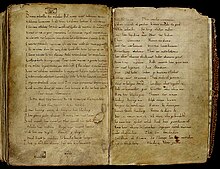
The Ludwigslied (in English, Lay or Song of Ludwig) is an Old High German (OHG) poem of 59 rhyming couplets, celebrating the victory of the Frankish army, led by Louis III of France, over Danish (Viking) raiders at the Battle of Saucourt-en-Vimeu on 3 August 881.
The poem is thoroughly Christian in ethos. It presents the Viking raids as a punishment from God: He caused the Northmen to come across the sea to remind the Frankish people of their sins, and inspired Louis to ride to the aid of his people. Louis praises God both before and after the battle.[1]
The poem is preserved over four pages in a single 9th-century manuscript formerly in the abbey of Saint-Amand, now in the Bibliothèque municipale, Valenciennes (Codex 150, f. 141v–143r). In the same manuscript, and written by the same scribe, is the Old French Sequence of Saint Eulalia.[2]

The poem speaks of Louis in the present tense: it opens, "I know a king called Ludwig who willingly serves God. I know he will reward him for it". Since Louis died in August the next year, the poem must have been written within a year of the battle. However, in the manuscript, the poem is headed by the Latin rubric Rithmus teutonicus de piae memoriae Hluduico rege filio Hluduici aeq; regis ("German song to the beloved memory of King Louis, son of Louis, also king"), which means it must be a copy of an earlier text.[3]
- ^ Bostock, King & McLintock 1976, p. 241.
- ^ Handschriftencensus 2024.
- ^ Harvey 1945, p. 7.